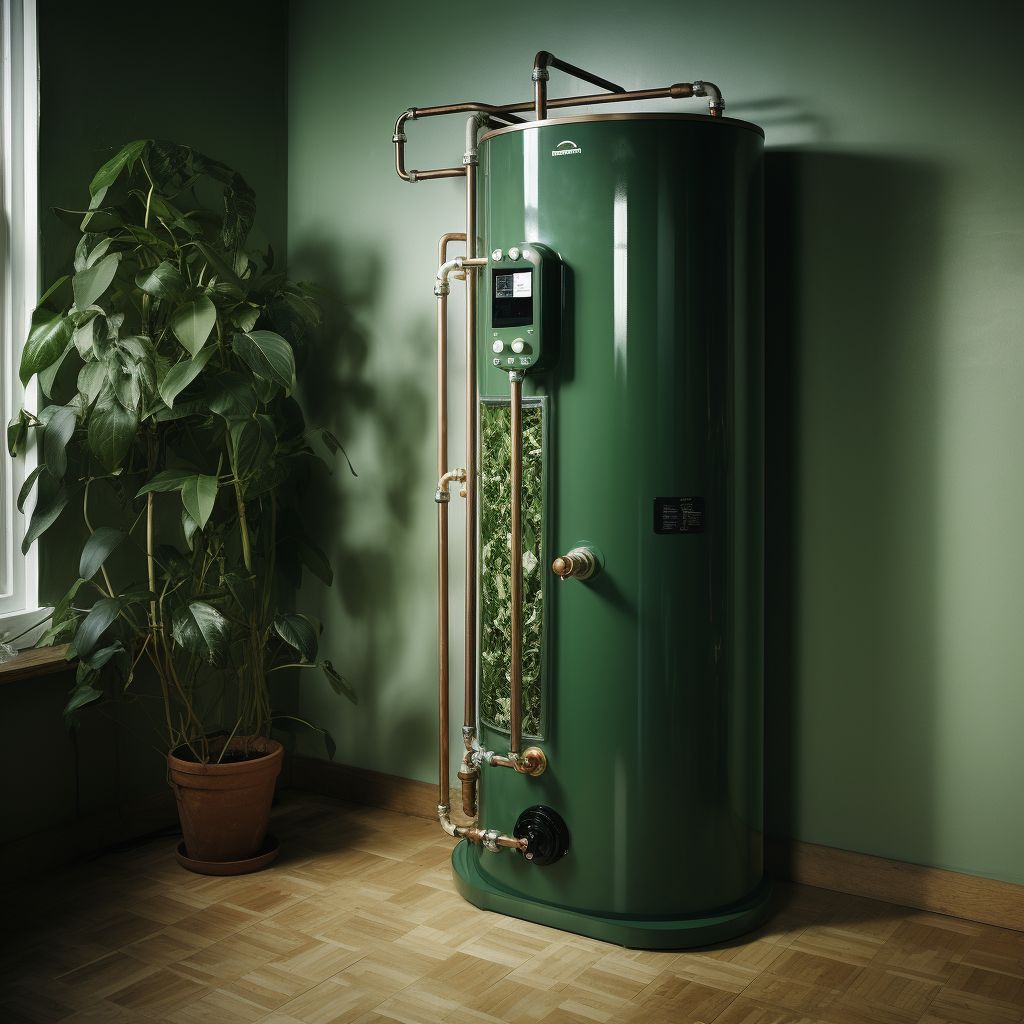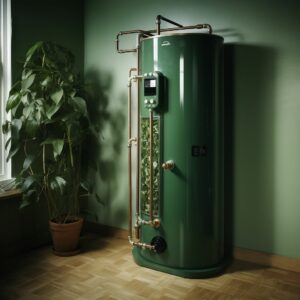Green Water Heating Solutions

You’re probably not thinking about the Green Water Heating Solutions’ Impact of Water Heaters on sustainability. But it’s high time you did. It’s not just about the energy consumed, but also the greenhouse gases emitted and resources depleted.
So, let’s dive into the environmental impact of water heaters and explore some sustainable alternatives. Because it’s your world too, isn’t it?
 Key Takeaways
Key Takeaways
- Water heaters consume a significant amount of energy on a daily basis, making Green Water Heating Solutions crucial in reducing energy consumption.
- Inefficient water heaters contribute to greenhouse gas emissions, particularly carbon dioxide, which is harmful to the environment.
- Inefficient water heaters deplete natural resources like water and energy, leading to water scarcity and energy waste.
- The inefficiency of water heaters can have a negative impact on ecosystems, including harming aquatic life and disrupting the balance of rivers, lakes, and oceans.
Energy Consumption of Water Heaters
Often, you don’t realize how much energy your water heater consumes on a daily basis. It’s a silent energy hog, especially if it’s not running efficiently. Heater efficiency is crucial in energy consumption. A more efficient heater uses less energy to heat water, reducing your energy bill and environmental impact. That’s why it’s essential to regularly maintain your heater, ensuring it’s working at its peak efficiency.
Temperature regulation is another critical factor. The higher you set the temperature, the more energy it uses. So, it’s wise to keep it set at a reasonable temperature. You won’t just be saving energy, you’ll also be preventing accidental scalding. Remember, every little bit of conservation helps.
Greenhouse Gas Emissions From Water Heaters
Regularly, your water heater’s energy usage isn’t just affecting your bills, it’s also contributing to greenhouse gas emissions. When your heater isn’t efficient, it consumes more energy and in turn, produces more carbon dioxide, a harmful greenhouse gas.
This is where emission regulations come into play, setting limits on the amount of pollutants that can be released into the environment. Having a heater that meets or exceeds these regulations can significantly reduce your home’s carbon footprint.
So, it’s not just about heater efficiency for the sake of lower bills, but for the sake of our planet too. Remember, every bit counts when it comes to Green Water Heating Solutions.
Therefore, when choosing a water heater, consider both its efficiency and emission ratings.
Water Heaters and Natural Resource Depletion
In your quest for a sustainable home, it’s important to understand that inefficient water heaters don’t just emit more greenhouse gases, they also deplete our natural resources at an alarming rate. With water scarcity becoming a global crisis, the gallons wasted by inefficient heaters can’t be ignored.
Every time your water heater takes too long to heat up or maintains unnecessary hot water, it’s essentially wasting water. This contributes to water scarcity, as well as energy waste, another natural resource we can’t afford to squander.
Enhancing heater efficiency isn’t just good for your bills, it’s crucial for the planet. Investing in energy-efficient models and regular maintenance can greatly reduce this resource wastage, making a significant positive impact on the environment.
Impact on Ecosystems
You mightn’t realize it, but your water heater’s inefficiency can have a devastating impact on local and global ecosystems. The energy it guzzles contributes to climate change, which in turn creates conditions ripe for aquatic disruption.
Unusually high water temperatures can harm aquatic life, disrupting the balance of our rivers, lakes, and oceans. And it’s not just aquatic ecosystems that suffer. Land-based flora and fauna also feel the heat, leading to biodiversity loss.
It’s a chain reaction that starts in your basement and ends up affecting the world’s most vulnerable species. So, next time you’re about to crank up your water heater, remember the ripple effect your actions can have.
Your choices matter, and they can help protect our planet.
Sustainable Water Heater Alternatives
Having noted the environmental impact of inefficient water heaters, it’s time to explore sustainable alternatives that you can adopt.
Solar boilers, for instance, harness the sun’s power to provide hot water. They’re cost-effective in the long run and significantly reduce carbon emissions.
Another green alternative is geothermal heat pumps. They utilize the heat stored underground to warm your water and home, making them exceptionally eco-friendly.
By opting for these sustainable alternatives, you’re not only reducing your carbon footprint but also saving on energy costs. It’s a win-win situation for you and the environment.
Frequently Asked Questions
How Does the Manufacturing Process of Water Heaters Affect Environmental Sustainability?
When you consider the manufacturing process of water heaters, it’s key to note that it affects environmental sustainability through significant manufacturing emissions and high resource consumption. This process can certainly be more eco-friendly.
What Is the Average Lifespan of a Water Heater and How Does Its Disposal Impact the Environment?
Your water heater typically lasts 10-15 years. When it’s time for disposal, it impacts our environment. However, with proper disposal alternatives, you can minimize this effect. Always consider water heater efficiency!
Can Water Heaters Contribute to Water Pollution and if So, How?
Yes, water heaters can contribute to water pollution. Heater emissions release harmful substances into the environment, and these can contaminate water sources. It’s crucial to responsibly dispose old heaters to minimize this risk.
Are There Any Government Regulations or Incentives to Promote the Usage of Sustainable Water Heaters?
Yes, there are government regulations and incentives promoting sustainable water heaters. You’ll find tax credits, rebates, and green financing for energy-efficient models, all aimed at reducing environmental impact and promoting sustainability.
How Do Different Types of Water Heaters (Gas, Electric, Solar) Compare in Terms of Their Environmental Impact?
When comparing water heater types, solar is the greenest, followed by gas, then electric. Energy efficiency comparisons and water heater recycling can dramatically reduce their environmental impact. It’s crucial to consider these factors.
Conclusion
So, you see, The Impact of Water Heaters on Sustainability are huge. They’re energy-hungry, contribute to greenhouse gas emissions, deplete natural resources, and disrupt ecosystems.
But don’t worry, you’ve got options. Consider sustainable alternatives like solar or tankless water heaters. They’re kinder to the planet, and they could be kinder to your wallet too.
Let’s make a collective effort to choose more sustainable water heaters. After all, every little bit helps.
Would like to learn more about JMK Plumbing? WATER HEATERS AND ENVIRONMENTAL SUSTAINABILITY